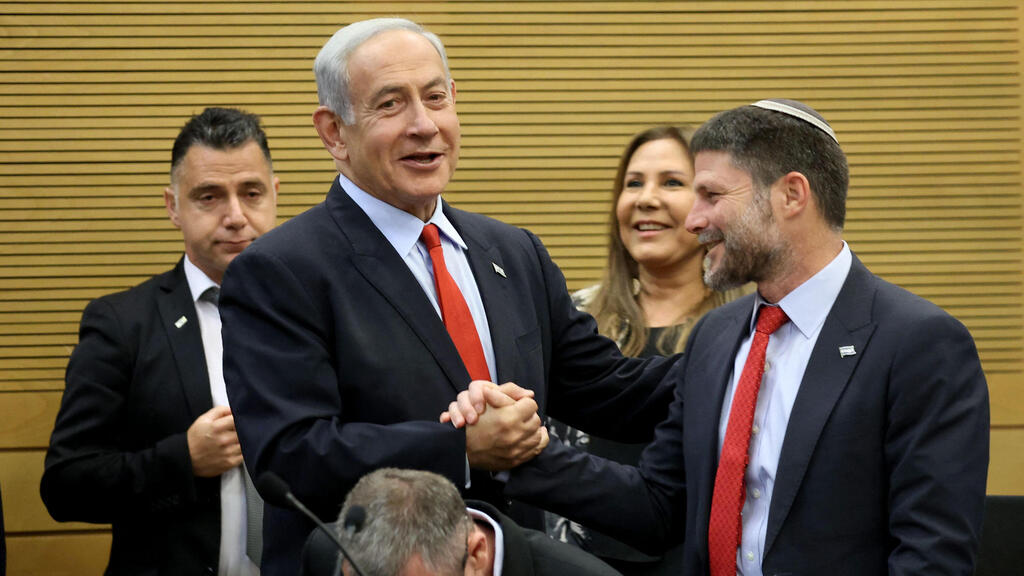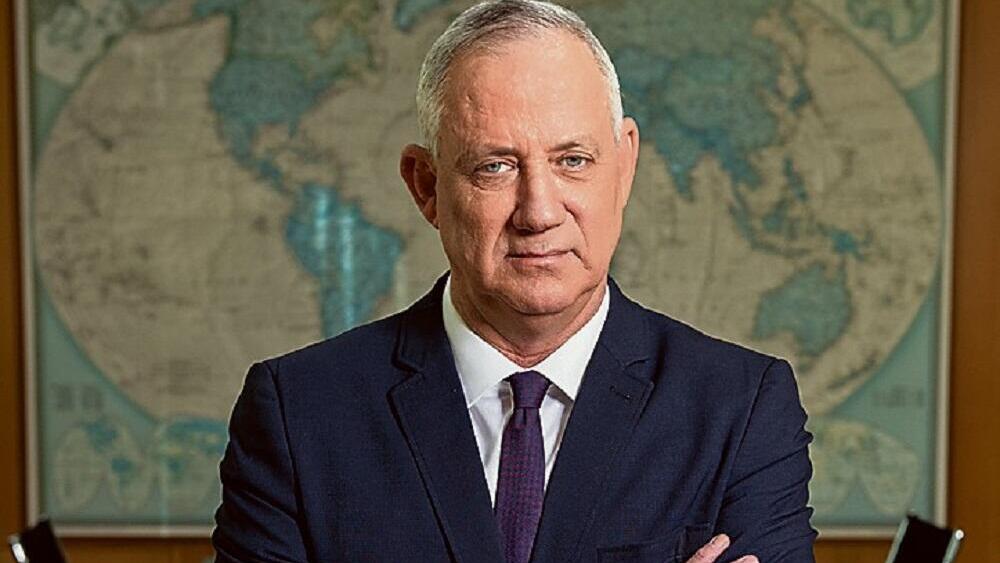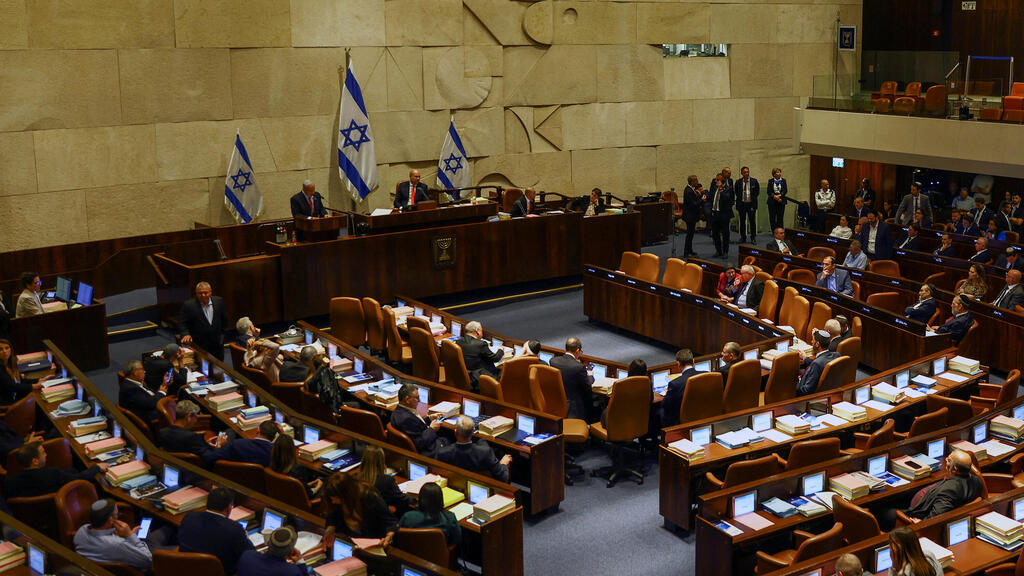Getting your Trinity Audio player ready...
Prime Minister Benjamin Netanyahu said Wednesday morning that the judicial overhaul will now return to the agenda after passing his 2023, 2024 budget. Netanyahu was asked if the plan that the government under his leadership tried to promote "will come back," and he replied: "Certainly". Immediately afterward he emphasized: "But we are trying to reach an understanding, and I hope we will succeed in this." Blue and White leader Benny Gantz said in response that the "power drunk" prime minister will bring the country to a boil.
4 View gallery


Bezalel Smotrich congratulates Benjamin Netanyahu after passing the state budget
(Photo: AFP)
Other stories:
Gantz who is considered moderate among negotiators from the opposition seeking broad agreement on legislation concerning Israel's judiciary said "I would remind the prime minister it is stupid to repeat the same action and expect a different outcome. If the judicial revolution is back on the table, we will shake this country to its core and stop it," Gantz said.
Netanyahu made it clear in an interview with Channel 14 that his next goal is to address the cost of living, even though the parts related to the fight against monopolies were removed from the regulations law accompanying the new budget.
Recall that Netanyahu froze the advancement of judicial reform legislation at the end of March in the shadow of the widespread protest that broke out in Israel – and reached its peak in the "Night of Rage" that broke out when Netanyahu announced that he would fire Defense Minister Yoav Gallant after Gallant warned of "tangible dangers to the security of the state" and called for a halt to the legislation.
The Knesset then entered the Spring recess during which reconciliation talks between representatives of the coalition and the opposition began at the President's Residence. But the talks are proceeding at a relatively slow pace and no significant progress has been made – with an impasse remaining about proposed changes to the committee for selecting judges that are a red line for Justice Minister Yariv Levin and Constitution Committee Chair Simcha Rotman. A majority of the coalition representatives on the committee want to allow the appointment of some Supreme Court justices – while the opposition insists on preventing any politicization of the process.
Levin and Rotman insist that the government approve at least parts of the judicial reform in case the talks collapse, and the chairman of the Constitutional Committee charged just last week in an interview with the Ynet Studio that the opposition is "determined to blow up" the negotiations. As he has already stated several times, Rotman insists: "If there are no agreements, If there is an explosion, we will move forward unilaterally in the Knesset plenum."
According to Rotman, "the distances between the parties are not great, and if the opposition wants to reach agreements – it can happen tomorrow morning."
Rothman also warned this month that not advancing the judicial reform legislation could harm the stability of the government itself. "A coalition that does not keep its promises does not survive," he said.
The opposition, on the other hand, has warned against dragging out the compromise talks – with the purpose of taking the wind out of the sails of the protest movement.
Opposition head Yair Lapid has already indicated the next main target: next month's Knesset election of its representatives to the judicial selection committee. According to Lapid, a sign of the coalition's seriousness would be if it allowed, as has been traditional, to elect a representative of the opposition to the committee alongside the coalition representative –although the government could also appoint two coalition representatives; this possibility was recently brought up by Cabinet Secretary Yossi Fox.
Netanyahu's statement about the return of judicial reform came shortly after the approval of the 2023-2024 biennial budget by his government, after a discussion that lasted 35 hours.
Voting in the Knesset began on Tuesday night on the budget legislation - which also includes the Arrangements law under which a number of reforms were approved such as the establishment of the controversial property tax fund –and the last vote on the budget came on Wednesday morning at around 6:10 a.m.
The budget passed with a majority of 64 Knesset members in favor and 56 voted against. No lawmakers were absent from the coalition or the opposition.
The state budget for 2023 will be 484 billion shekels ($130.7 billion) and in 2024 it will be 514 billion shekels ($138.9 billion). This is the largest budget in the country's history, and next year it will be more than half a trillion shekels for the first time. About 14 billion shekels ($3.8 billion) of this money will be awarded to the coalition parties that caused an uproar.
Plenum
The Arrangements Law that also was approved, according to Finance Minister Bezalel Smotrich, "includes measures to accelerate growth and raise the standard of living and focuses on five main goals: accelerating infrastructure and handling the housing market, increasing competition and reducing centralization, strengthening human capital, reducing regulation and bureaucracy for the business sector and citizens, and streamlining the public sector."
The announcement did not mention that most of the sections of the chapter that was supposed to fight the cost of living, while imposing restrictions on large importers, were removed from the Arrangements Law. In fact, despite the government's promises, the law does not contain any legislation that would impose restrictions on the large monopolies in the economy and therefore does not herald any moves to combat the cost of living.
Smotrich said Wednesday morning that the budget "reflects the government's stability" and claimed that it is an "excellent" budget that is "biased toward growth" – despite warnings from senior officials in his ministry that the large amounts of money that will be poured into ultra-Orthodox institutions that do not teach the core curriculum or teach it only partially may harm future growth.
The opposition strongly attacked the passing of the budget, and Opposition Leader Yair Lapid tweeted: "While you were sleeping, the worst and most destructive budget in the history of the country was passed. There is no good news in it, there is no fight against the cost of living, there is only endless extortion. This budget is a violation of the contract with the citizens of Israel. All of us and our children and our children's children will pay for it."
The chairman of the National Unity party Benny Gantz said: "This is a sad day for the State of Israel. The man who denied the citizens of Israel a budget for political reasons, today turned the budget once again into a tool in the political game. The State of Israel fell into the hands of an extremist coalition that put the Israeli economy and Israeli society on the altar of politics. Instead of bringing good news to many old people, children, people with disabilities, young couples, and residents of the Negev and the Galilee, a budget has now been passed that takes care of political dealings and is based on the feel of silence. This evening we call on the generations. Just as reality shattered in front of Netanyahu in the coup d'état, it will also shatter in front of him in the budget. Until then, unfortunately, the citizens of Israel will pay the price."




